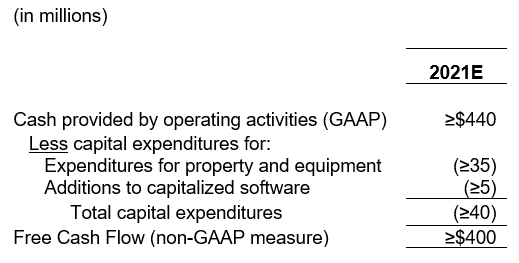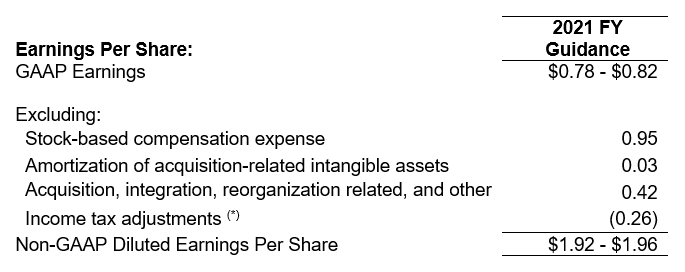9. Sept. 2021 | San Diego
Presents Long-Term Financial Growth Targets, Including More Than $1 Billion in Cloud Annual Recurring Revenue (ARR) and Approximately $550 Million in Free Cash Flow in Fiscal 2025
Reaffirms Fiscal 2021 Financial Outlook
Teradata (NYSE: TDC) highlighted the Company’s successful cloud-first transformation and ongoing strategic initiatives to deliver sustainable growth and value creation at its Investor Day held virtually today.
“Over the course of the last year, we have embarked on a journey to cloud-first and today, we are a new, reimagined Teradata – a profitable growth company with the right strategy, technology and team to win in a large and growing market,” said Steve McMillan, Teradata President and CEO. “We have long been trusted by our customers but what sets Teradata apart is our unique ability to provide a true hybrid, multi-cloud solution, delivering the best price performance at scale in the industry.”
McMillan continued, “This year we continuously focused on delivering on our commitments, including building our recurring revenue streams into sustainable and profitable revenue and free cash flow. All of which positions us to achieve over $1 billion in Cloud ARR(1) and approximately $550 million in free cash flow(2) in fiscal 2025 and deliver significant long-term value to our shareholders.”
A Reimagined Teradata
At the Investor Day event, Teradata’s new leadership team outlined its three foundational cornerstones for long-term growth and value creation:
- Well-positioned to win in a large and rapidly growing market in the cloud supported by patented technology and differentiated hybrid, multi-cloud capabilities;
- Strong position in the enterprise market, with expanded focus on the global 10,000 companies across seven key verticals; and
- Industry-leading management team and more than 7,000 global workforce with rich knowledge and deep expertise.
Continued Strong Financial Performance Through Fiscal 2025 and Beyond
Teradata today provided financial targets through fiscal 2025, including:
- More than $1 billion in Cloud ARR, representing over 50% in total ARR in fiscal 2025(1);
- Approximately $550 million free cash flow in fiscal 2025(2);
- Low 20% non-GAAP operating margin in fiscal 2025(3); and
- Implementing a returns-based capital return program of at least 50% of free cash flow annually through fiscal 2025(2).
For fiscal 2022, the company preliminarily estimates:
- At least 70% growth in Cloud ARR year-over-year(1);
- Non-GAAP diluted net earnings per share in the range of $1.60 to $1.70(3); and
- Free cash flow of approximately $400 million(2).
Non-GAAP diluted net earnings per share in fiscal 2022 is expected to be impacted primarily by upfront recurring revenue recognized in fiscal 2021.
Reaffirmation of 2021 Financial Outlook
Teradata also today reaffirmed its outlook for fiscal 2021, which was previously provided in its second-quarter 2021 financial results press release issued on August 5, 2021:
- Public cloud ARR is expected to increase by at least 100% year-over-year(1);
- Total ARR is expected to grow at a mid-to-high-single-digit percentage year-over-year(1);
- Recurring revenue is expected to grow at a high-single-digit to low-double-digit percentage year-over-year;
- Total revenue is expected to grow at a low-single-digit to mid-single-digit percentage year-over-year;
- GAAP earnings per diluted share is expected to be in the range of $0.78 to $0.82;
- Non-GAAP earnings per diluted share, excluding stock-based compensation expense, reorganization-related expenses, and other special items, is expected to be in the range of $1.92 to $1.96(3);
- Cash flow from operations is expected to be at least $440 million; and
- Free cash flow is expected to be at least $400 million(2).
Webcast Replay and Supplemental Material
To access the replay of today’s virtual Investor Day event and presentation materials, visit the investor relations page of Teradata’s website at https://investor.teradata.com.
1. Annual recurring revenue (ARR) is defined as the annual value at a point in time of all recurring contracts, including subscription, cloud, software upgrade rights, and maintenance. ARR does not include managed services and third-party software.
Cloud ARR represents public cloud ARR, which is defined as the annual value at a point in time of all contracts related to public cloud implementations of Teradata Vantage and does not include ARR related to private or managed cloud implementations.
2. Free cash flow is a non-GAAP measure. As described below, the Company believes that free cash flow is a useful non-GAAP measure for investors. Teradata defines free cash flow as cash provided by / used in operating activities, less capital expenditures for property and equipment, and additions to capitalized software. Free cash flow does not have a uniform definition under GAAP and, therefore, Teradata’s definition may differ from other companies’ definitions of this measure. Teradata’s management uses free cash flow to assess the financial performance of the Company and believes it is useful for investors because it relates the operating cash flow of the Company to the capital that is spent to continue and improve business operations. In particular, free cash flow indicates the amount of cash generated after capital expenditures for, among other things, investment in the Company’s existing businesses, strategic acquisitions, strengthening the Company’s balance sheet, repurchase of the Company’s stock and repayment of the Company’s debt obligations, if any. Free cash flow does not represent the residual cash flow available for discretionary expenditures since there may be other nondiscretionary expenditures that are not deducted from the measure. This non-GAAP measure is not meant to be considered in isolation to, as a substitute for, or superior to, results determined in accordance with GAAP, and should be read only in conjunction with our condensed consolidated financial statements prepared in accordance with GAAP.
The following table reconciles Teradata’s projected cash provided by operating activities under GAAP to projected free cash flow for fiscal 2021.

For estimates of free cash flow for fiscal 2022 and fiscal 2025, Teradata is not providing a reconciliation to the most comparable GAAP measure (cash provided by operating activities estimate) as non-GAAP adjustments relate to events that have not yet occurred and would be unreasonably burdensome to forecast.
3. Teradata reports its results in accordance with GAAP. However, as described below, the Company believes that certain non-GAAP measures such as non-GAAP earnings per diluted share, or EPS, and non-GAAP operating margin, which exclude certain items (as well as free cash flow) are useful for investors. Our non-GAAP measures are not meant to be considered in isolation to, as substitutes for, or superior to, results determined in accordance with GAAP, and should be read only in conjunction with our condensed consolidated financial statements prepared in accordance with GAAP. Each of our non-GAAP measures do not have a uniform definition under GAAP and therefore, Teradata’s definition may differ from other companies’ definitions of these measures.
The following tables reconcile Teradata’s projected EPS under GAAP to the Company’s projected non-GAAP EPS for fiscal 2021, which exclude certain specified items. Our management internally uses supplemental non-GAAP financial measures, such as gross profit, operating income, operating margin, net income, and EPS, excluding certain items, to understand, manage and evaluate our business and support operating decisions on a regular basis. The Company believes such non-GAAP financial measures (1) provide useful information to investors regarding the underlying business trends and performance of the Company’s ongoing operations, (2) are useful for period-over-period comparisons of such operations and results, that may be more easily compared to peer companies and allow investors a view of the Company’s operating results excluding stock-based compensation expense and special items, (3) provide useful information to management and investors regarding present and future business trends, and (4) provide consistency and comparability with past reports and projections of future results.

* Represents the income tax effect of the pre-tax adjustments to reconcile GAAP to Non-GAAP income based on the applicable jurisdictional statutory tax rate of the underlying item. Including the income tax effect assists investors in understanding the tax provision associated with those adjustments and the effective tax rate related to the underlying business and performance of the Company’s ongoing operations.
For non-GAAP Diluted Earnings Per Share preliminary estimate for fiscal 2022, Teradata is not providing a reconciliation to the most comparable GAAP measure (GAAP Diluted Earnings Per Share preliminary estimate for fiscal 2022) as non-GAAP adjustments relate to events that have not yet occurred and would be unreasonably burdensome to forecast. In addition, for the non-GAAP operating margin target for fiscal 2025, Teradata is not providing a reconciliation to the most comparable GAAP measure (GAAP operating margin target for fiscal 2025) as non-GAAP adjustments relate to events that have not yet occurred and would be unreasonably burdensome to forecast.
Note to Investors
This release contains forward-looking statements within the meaning of Section 21E of the Securities and Exchange Act of 1934. Forward-looking statements generally relate to opinions, beliefs, and projections of expected future financial and operating performance, business trends, and market conditions, among other things. These forward-looking statements are based upon current expectations and assumptions and involve risks and uncertainties that could cause actual results to differ materially, including the factors discussed in this release and those relating to: the global economic environment and business conditions in general or on the ability of our suppliers to meet their commitments to us, or the timing of purchases by our current and potential customers; the rapidly changing and intensely competitive nature of the information technology industry and the data analytics business; fluctuations in our operating results; our ability to realize the anticipated benefits of our business transformation program or other restructuring and cost saving initiatives; risks inherent in operating in foreign countries, including foreign currency fluctuations; risks associated with the ongoing and uncertain impact of the COVID-19 pandemic on our business, financial condition and operating results, including the impact of the COVID-19 pandemic on our customers and suppliers; risks associated with data privacy, cyberattacks and maintaining secure and effective internal information technology and control systems; the timely and successful development, production or acquisition, availability and/or market acceptance of new and existing products, product features and services; tax rates; turnover of workforce and the ability to attract and retain skilled employees; protecting our intellectual property; the availability and successful exploitation of new alliance and acquisition opportunities; subscription arrangements may be cancelled or fail to be renewed; the impact on our business and financial reporting from changes in accounting rules; and other factors described from time to time in Teradata’s filings with the U.S. Securities and Exchange Commission, including its annual report on Form 10-K for the year ended December 31, 2020 and subsequent quarterly reports on Forms 10-Q, as well as the Company’s annual report to stockholders. The forward-looking statements included in this release are made as of September 9, 2021, and Teradata does not undertake any obligation to publicly update or revise any forward-looking statements, whether as a result of new information, future events or otherwise, except as required by law.
Bei Teradata sind wir überzeugt, dass Menschen erfolgreicher sind, wenn sie über bessere Informationen verfügen. Unsere Cloud-Analytics- und Datenplattform für KI liefert harmonisierte Daten und vertrauenswürdige KI/ML. Unternehmen können dadurch bessere Entscheidungen treffen, schneller Innovationen vorantreiben und nachhaltige Geschäftsergebnisse schaffen. Erfahren Sie mehr auf: Teradata.de.

